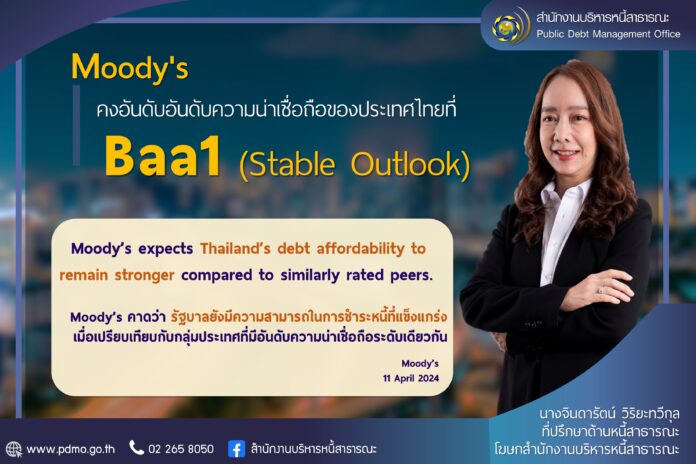

Moody’s Ratings affirmed Thailand’s Baa1 rating with a stable outlook, citing expectations of stabilizing government debt and strong debt affordability.
The public debt advisor, as well as a spokeswoman of the Public Debt Management Office, Ministry of Finance, Jindarat Viriyataveekul said Moody’s Investors Service(Moody’s) maintained the stable outlook.
Moody’s Rating reported Thailand’s economic recovery is expected to continue in 2024 and 2025 with 3 % each, higher from 1.9% last year, as well as its strong macroeconomic policy effectiveness also supporting its rating at Baa1, and others supported by goods exports, and public investment.
Tourism sector is projected to reach 35 million this year, up from 28 million last year, as well as foreign visitors are forecasted to meet 40 million in 2025 which would be at level of pre-pandemic (Covid-19). Sustainability growth in the tourism industry would stimulate private consumption and private investment which will support Thai economic growth.
Public investment is expected to jump after the disbursement, as well as the investment growth which would be contributed by both public and private sector in the Eastern Economic Corridor.
Thailand’s economic strength may benefit from productivity gains, including through the ramp-up of the Eastern Economic Corridor to a greater extent than Moody’s Ratings currently expects.
Conversely, downside risks stem from potential material delays to fiscal consolidation, leading to continued increases in the government debt burden over the medium term. However, Moody’s Rating expects the Thai government will have capability to implement conservative fiscal policy making while the Thai government is strong debt affordability.
“Moody’s Rating will closely monitor productivity, the government’s economic restructuring in order to strengthen Thai competitiveness, and a management on public debt and the road to fiscal consolidation.” Said Mrs Jindarat.
The rating also takes into account material downward pressure on the economy’s growth potential from rapid population ageing, while investments have been sluggish limiting potential for stronger productivity growth over the near to medium term. Polarisation and its associated political risks continue to constrain the rating by constraining progress on significant reforms and fueling uncertainty which hampers investment.
Thailand’s local and foreign currency country ceilings remain unchanged at Aa3 and A1, respectively. The four-notch gap between the local currency ceiling and sovereign rating reflects a balance between the country’s strong external balances and effective institutions, against the government’s relatively large footprint in the economy and moderate political risks.
The country’s local and foreign currency country ceilings remain unchanged at Aa3 and A1, respectively, with considerations for external balances, effective institutions, and potential capital controls.
Reference Moody ratings










